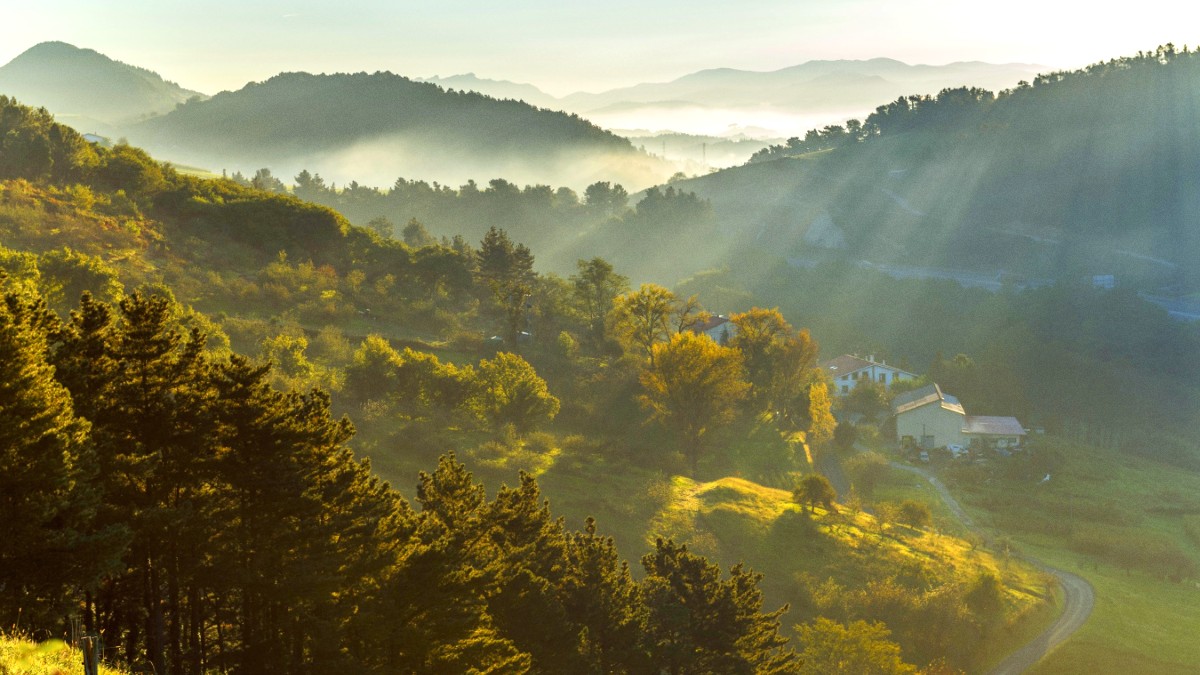
Spain
The Basque Country, known as Euskadi in Basque and País Vasco in Spanish, forms an autonomous community in northern Spain. It sits along the Bay of Biscay. France borders it to the northeast. Cantabria and Castilla y León are to the west, La Rioja to the south, and Navarre to the east. The region consists of three historical territories or provinces: Álava (Araba), Gipuzkoa (Guipúzcoa), and Biscay (Bizkaia).
The Bay of Biscay shapes the coastal climate and lifestyle, while inland areas present a more continental feel. The coastline offers high cliffs, hidden coves, and wide sandy beaches. Inland, the Cantabrian Mountains provide a backdrop of peaks and valleys, with forests of beech and oak trees.
Rivers like the Nervión and Oria carve their way through the land, contributing to its green character. Consistent rainfall, especially outside of summer, sustains the lush landscape. This geographical variety supports outdoor pursuits and offers varied scenic drives.
Their distinct language, Euskera (Basque), is a linguistic isolate. It relates to no other known Indo-European language, indicating a deep and separate historical lineage. This linguistic uniqueness marks a strong Basque identity, a source of pride and cultural resilience. Its survival through centuries of external pressures testifies to the strength of Basque culture.
The region is a long history of self-governance and a strong sense of cultural identity. This continued despite various occupations and political changes throughout centuries. Historical "fueros," or charters, granted the Basque provinces unique rights and self-rule. These rights were often challenged but frequently reaffirmed, highlighting the Basque desire for autonomy. During the Spanish Civil War and subsequent Franco dictatorship, Basque culture and language faced severe suppression. Modern autonomy was granted in 1979, restoring much of its self-governance and allowing the Basque language and culture to thrive once again.
A linguistic isolate, unrelated to other Indo-European languages, a core element of Basque identity.
Historical charters that provided unique rights and self-rule to Basque provinces.
Shipbuilding and steel industries brought prosperity and migration, contrasting with older traditions.
People historically voyaged as sailors, whalers, and explorers.
Private clubs for cooking and eating, reflecting a communal food approach.
The region is also known for its strong culinary traditions. This includes the development of modern Basque cuisine and the unique gastronomic societies (Txokos). These private clubs, where members gather to cook and eat, reflect a communal approach to food and an appreciation for quality ingredients. This culinary heritage, paired with modern innovation, has positioned the Basque Country as a world leader in gastronomy, attracting food enthusiasts from everywhere.
The Basque people share a strong sense of identity. Showing interest in their language and culture is appreciated. Learning a few Basque phrases, like "Eskerrik asko" (thank you), can create a positive impression.
Roads in the Basque Country are well-maintained, and driving offers a way to see the diverse landscapes at your own pace.
This recent history shapes much of the region's contemporary identity and political landscape.
The Basque Country offers a compelling blend of distinct culture, striking landscapes, and exceptional food. Here is a quick overview for travelers:
Experience one of Europe’s oldest and most unique cultures. Explore San Sebastián, Vitoria-Gasteiz, and Bilbao for distinct urban experiences.
Enjoy green, rolling hills, dramatic cliffs, and beautiful beaches. Outdoor activities range from surfing to hiking coastal trails.
The region is a global gastronomy hub. Indulge in pintxos or explore Michelin-starred restaurants. Sample Txakoli wine and local cider.
The climate is oceanic, with warm summers and mild, wet winters. An efficient public transport network connects major cities, and buses and trains simplify intercity journeys.